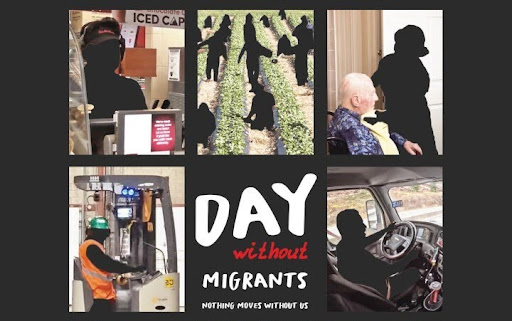On Wednesday, migrant workers and students across Canada highlighted the crucial role they play in the Canadian economy through the ‘Day Without Migrants’ campaign. Led by the International Migrants’ Alliance of Canada (IMA), protests occurred in eight Canadian cities including Toronto, Montreal and Vancouver.
The ‘Day Without Migrants’ coincided with International Migrants day which was established by the United Nations to recognize contributions of migrants all over the world.
Members of IMA and other migrants are saying they are essential to Canada’s economy and society but recent immigration policy changes indicate the government does not value their contributions.
Released in October, the federal government’s Immigration Levels Plan revealed the Liberals are lowering their targets for new permanent residents and, for the first time ever, new temporary residents. Canada will now be aiming to give permanent status to 395,000 people in 2025, a 105,000 decrease from the country’s previous target. Other measures, including a cap on international student intake and tighter restrictions on who can receive a temporary work permit, are expected to reduce the number of temporary residents by more than 445,000 people per year in 2025 and 2026.
Migrant workers and their supporters have been posting photos as part of the IMA selfie campaign on social media. The posts aim to highlight the reliance Canada has on immigrants.
“Without migrants, long-term care would look very grim,” reads one image on IMA’s facebook page.
“We are workers! We are not slaves!” another image reads.
Migrants are being scapegoated for a crisis caused by government policy, said Gabriel Allahdua, member of the migrant workers’ steering committee for the Canadian Council of Refugees. Allahdua said Canada relies on migrants and should not turn their backs on them when it is popular to do so. Looking at international students as an example, he said immigrants contribute billions of dollars to the economy.
Analysis from Global Affairs Canada found international students contributed $30.9 billion to Canada’s GDP in 2022. Internal documents from the Ontario Ministry of Colleges and Universities showed international students provided 28 per cent of the revenue at publicly assisted colleges in the 2021-2022 school year. Statistics Canada data shows the cost of tuition for undergraduates with Canadian citizenship this school year was a little over $6,500 in tuition. International undergraduates paid more than $35,400 in tuition.
“Even the government has admitted that they are cash cows for the education system,” Allahdua said. “A couple of months ago, [international students] were saviors. At a time when Canada was suffering from a labor shortage, international students worked up to 40 hours [per week]. This is double what they normally would work.”
Immigrants are a major driver of the economy
Mehakdeep Singh, a protestor participating in an encampment of graduated international students, said recent immigration changes are insulting because they push out the very people who have saved Canada from a recession.
“If you worked to uphold the economy of a country you call home, and your government suddenly went back on their word, would you simply accept that?” Singh said in a press release.
Singh said it is unacceptable that Canada has brought forward this “use-and-throw” policy.
“We are asking for Canada to honour the sacrifices we made during COVID and to honour their promise of a pathway to permanent residency,” he added.
When the new immigration targets were announced in October, it was not only migrants who were concerned. The Canadian Federation of Independent Businesses (CFIB) released a statement saying business owners’ heads were spinning.
“CFIB is already receiving panicked calls from small business owners, including many who are heartbroken to have to say goodbye to their foreign workers who are already in Canada and whose visas are soon to expire,” said CFIB president Dan Kelly in a press release.
He added that the cut to permanent immigration levels is also troubling even if the unemployment rate is on the rise.
“There are still 379,000 persistent vacancies in the private sector,” Kelly said. “And while we are experiencing housing pressures right now, any look at Canada’s demographics reveals we will struggle to maintain a strong workforce without robust immigration.”
Alex Paterson, spokesperson for the Bank of Canada, said the bank does not have comments on whether tightening immigration is an appropriate response to high housing prices. He did note, however, that the bank’s governor has previously said the figures in the Immigration Levels Plan could imply a lower GDP growth forecast coming in January.
While there is concern about immigration restrictions dampening economic growth, immigration minister Marc Miller and the government say these restrictions are necessary to bring down the cost of housing.
‘Housing crisis was not caused by immigration,’: IRCC
Michelle Carbert, spokesperson for Immigration, Refugees and Citizenship Canada (IRCC), pointed to a 2023 study by the Bank of Canada which indicates housing supply has not been able to keep pace with population growth. As such, increasing demand has driven up prices.
“It’s important to note that the housing crisis was not caused by immigration,” Carbert said. “We are pursuing strategies that support Canada’s continued need for immigration while also addressing our current housing situation. For the federal government, this means aligning our immigration policies with measures taken to address infrastructure and housing challenges.”
The Parliamentary Budget Officer found that if the new immigration measures affect the population as planned, the housing supply gap could close by 534,000 units in 2030.
Carbert said the international student cap has already brought down the volume of temporary residents in university towns and recent reports show those same towns have seen rent prices stagnate.
“The levels that we put forward this year are ones that are still ambitious. They still plan for a growing economy,” minister Miller said during a House of Commons committee meeting on November 25. “But it isn’t everyone that has the right to bring in whoever they want, whenever they want.”



